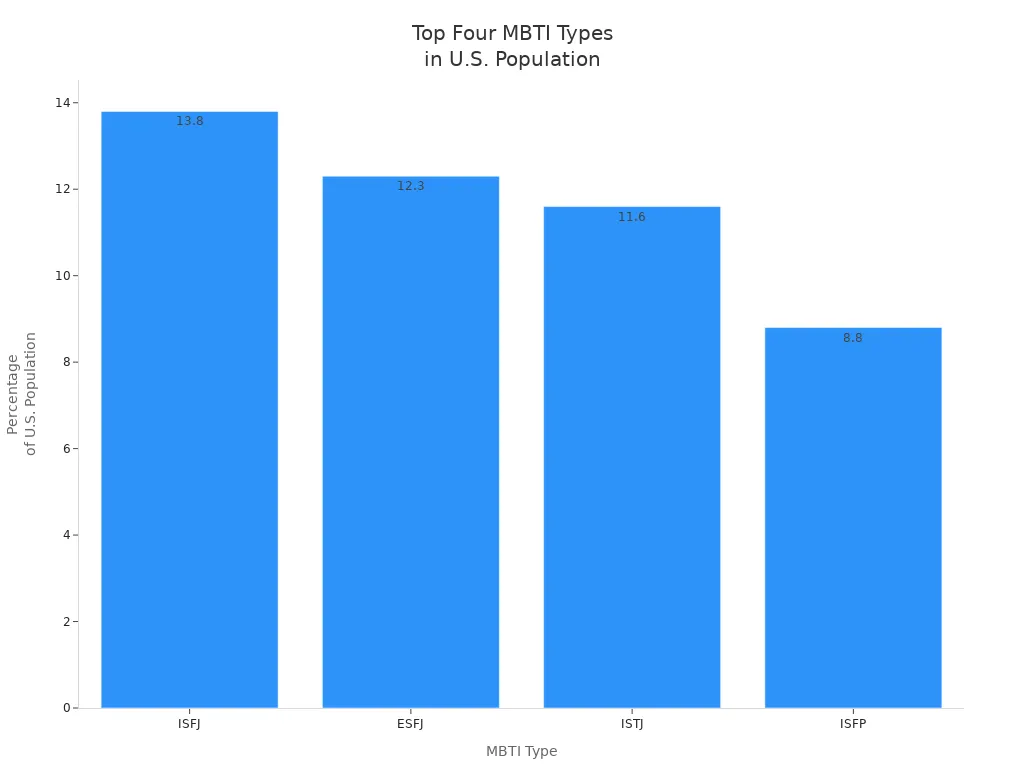Who Has the Strongest Personality in MBTI? A Complete Ranking

You may ask which MBTI type is the most noticeable. ENTJ is usually ranked first for a strong personality. They show this by being confident, leading others, and being brave. In MBTI, a strong personality means having willpower, power to affect others, energy, and wanting to be a leader.
Key Takeaways
- A strong personality in MBTI means you are sure of yourself, can guide others, and work hard to reach your goals. ENTJ is at the top for strong personality because they believe in themselves, make good plans, and like to be in charge. Each MBTI type has its own special strengths; quiet or gentle types are strong by being caring and always helping others.
Strong Personality in MBTI
What It Means
When people talk about a strong personality in MBTI, they mean someone who stands out. This person is not afraid to speak up or lead. They show traits like being assertive and having strong willpower. They also have leadership skills and lots of energy. People with strong personalities know what they want. They are not scared to take charge or share their ideas. Others often look up to them and feel inspired. These people help make changes happen.
Studies say extroverts often become leaders. They help others and share their dreams. Intuitive types like to think about new ideas. They are not scared of things that are unknown. People who like judging or perceiving can both be strong. They just show it in different ways. For example, perceiving types may help others and question old rules. Other research says being organized and calm helps too. Taking risks is also important for strong leaders.
Keep in mind, MBTI is about what you like, not what you can do. Everyone has their own strengths. No type is better than another.
Key Traits
You might wonder how strong personality traits look in real life. Here are some ways MBTI types show these traits:
| MBTI Type | How Strong Personality Traits Show Up |
|---|---|
| ENTJ | Very confident and direct. Likes to lead and get things done fast. |
| INTJ | Stays focused and plans carefully. Leads with big ideas and smart choices. |
| INFJ | Quiet but strong. Leads with kindness and strong beliefs. |
| ESTJ | Very organized and clear. Takes charge and finishes tasks. |
| ESTP | Brave and full of energy. Leads by doing things and taking chances. |
| ESFP | Friendly and lively. Inspires others with excitement and joy. |
Some people think MBTI puts you in a box, but that is not true. MBTI shows what you like, not what you can or cannot do. You can have a strong personality in many ways. You can be loud or quiet, bold or gentle.
- MBTI does not tell if you will do well at a job.
- Every type can work in any job.
- Use MBTI to learn about yourself, not to judge others.
Who Has the Strongest Personality?

ENTJ at the Top
You may wonder which MBTI type stands out most. ENTJ is often seen as having the strongest personality. People call ENTJs "Commanders" because they like to lead. They enjoy hard tasks and do not give up easily. You will often find them leading groups and making big choices. They keep their eyes on their goals.
- ENTJs do well as Project Managers or Chief Financial Officers. They help teams work together and fix problems quickly.
- They use logic and good planning to get ready for what is next. You can trust them to organize people and finish jobs.
- ENTJs talk with confidence and skip small talk. They get right to the point.
ENTJs push others to do their best. Their strong personality helps them lead any group.
Why ENTJ Leads
Let’s see why ENTJs are different from other types. They have lots of confidence and strong willpower. They make clear choices. ENTJs do not let problems stop them. They see feedback as a way to get better, not as an attack. You will notice they stay strong and focus on results.
Here is how ENTJ compares to other types:
| Personality Type | Dominance Level | Key Traits |
|---|---|---|
| ENTJ | High | Confident, assertive, goal-driven, strategic, direct |
| ESTJ | High | Decisive, organized, takes charge |
| ENFJ | High | Assertive, empathetic, leads with care |
| ENTP | High | Charismatic, confident, loves debate |
| INTJ | Low | Quiet, cautious, plans alone |
| INFJ | Low | Quiet, thoughtful, leads with kindness |
You can see that other types have their own strengths. But ENTJ’s mix of confidence, planning, and drive puts them at the top for strong personality.
MBTI Types Ranked by Strength

There are 16 MBTI types. Each one has a different kind of personality. Some types are bold and speak up a lot. Others lead in quiet ways. Some people like to help from the background. This list shows the types from most dominant to gentlest. The ranking is based on assertiveness, willpower, influence, and intensity.
1-4: Most Dominant
These four types usually take the lead. You see them in charge and making big choices. They set the pace for others. They have a strong personality in almost every group.
-
ENTJ (Commander)
ENTJs lead teams and want results. They enjoy hard tasks and do not give up. Their confidence and direct way make them stand out. Studies show ENTJs score highest in assertiveness and dominance. -
ESTJ (Executive)
ESTJs organize people and projects. They like clear rules and want others to follow them. You can trust them to finish what they start. -
ENTP (Debater)
ENTPs bring energy and new ideas. They love to debate and question old ways. You will see them lead with creativity and quick thinking. -
ENFJ (Protagonist)
ENFJs lead with care and vision. They inspire others and build strong teams. Their mix of empathy and assertiveness helps them guide groups.
You may notice these types in leadership and management jobs. Surveys show ENTJs and ESTJs are more common in these roles than in the general population.
| Rank | MBTI Type | Assertiveness & Leadership Traits |
|---|---|---|
| 1 | ENTJ | Confident, direct, strategic |
| 2 | ESTJ | Organized, decisive, commanding |
| 3 | ENTP | Energetic, persuasive, bold |
| 4 | ENFJ | Inspiring, assertive, empathetic |
5-8: Strong Leaders
These types also lead, but in more focused or special ways. You might see them as experts, planners, or motivators.
-
INTJ (Architect)
INTJs plan carefully and stick to their goals. They lead with vision and logic. Many INTJs work in special leadership jobs, even though they are rare. -
ESTP (Entrepreneur)
ESTPs act fast and love excitement. They lead by doing things and taking risks. You will see them solve problems quickly. -
INFJ (Advocate)
INFJs lead with strong values and quiet strength. They inspire others with deep beliefs and kindness. -
ESFJ (Consul)
ESFJs organize groups and care for others. They lead by building harmony and making sure everyone feels included.
Did you know? INTJs are only about 1% of people, but they show up more in special leadership jobs.
9-12: Quiet Strength
These types do not always want attention, but they are strong in their own way. You will notice their steady willpower and quiet influence.
-
ISTJ (Logistician)
ISTJs work hard and finish what they start. They lead by example and keep things running well. -
ESFP (Entertainer)
ESFPs bring energy and fun. They inspire others with their excitement and love for life. -
INFP (Mediator)
INFPs stand firm on their values. They lead with creativity and deep care for others. -
ENFP (Campaigner)
ENFPs motivate others with passion and new ideas. They encourage people to dream big.
Quiet strength means you do not have to be loud to make a difference. These types often help others grow and succeed.
13-16: Gentle Types
These types show strength in gentle, caring ways. They support others, notice small details, and create safe spaces. You may not see them leading from the front, but their influence is real.
-
ISTP (Virtuoso)
ISTPs solve problems with calm and skill. They act quietly and let their work speak for itself. -
ISFP (Adventurer)
ISFPs show care through actions, not words. They are gentle, sensitive, and loyal. You will see them help others in quiet ways. -
INTP (Logician)
INTPs think deeply and share ideas when needed. They like to work alone and avoid the spotlight. -
ISFJ (Defender)
ISFJs are the gentlest of all. They notice what others need and help without asking for praise. They value harmony and often work behind the scenes.
ISFPs and ISFJs are known for being gentle. They care deeply, help others, and avoid conflict. Studies show they show strength through loyalty and quiet support.
Here is a quick look at the ranking:
| Rank | MBTI Type | Description |
|---|---|---|
| 1 | ENTJ | Most assertive, confident leader |
| 2 | ESTJ | Organized, decisive, commanding |
| 3 | ENTP | Energetic, persuasive, bold |
| 4 | ENFJ | Inspiring, assertive, empathetic |
| 5 | INTJ | Visionary, strategic, focused |
| 6 | ESTP | Action-oriented, daring, quick |
| 7 | INFJ | Quiet, strong values, inspiring |
| 8 | ESFJ | Caring, organized, supportive |
| 9 | ISTJ | Reliable, steady, practical |
| 10 | ESFP | Energetic, lively, motivating |
| 11 | INFP | Creative, value-driven, gentle |
| 12 | ENFP | Passionate, encouraging, open |
| 13 | ISTP | Calm, skilled, reserved |
| 14 | ISFP | Gentle, sensitive, loyal |
| 15 | INTP | Thoughtful, quiet, independent |
| 16 | ISFJ | Gentle, caring, behind-the-scenes |

You can see that ISFJ and ESFJ are the most common types in the U.S. Even though they are gentle, their steady support makes a big impact.
What Makes a Gentle Type?
- ISFPs help others in practical ways.
- ISFJs notice small details and make others feel comfortable.
- Both types avoid conflict and want harmony.
- They may not talk much, but their actions show deep strength.
You can have a strong personality even if you are quiet or gentle. Every MBTI type has something special to offer. Whether you lead from the front or help from behind, your strengths matter.
Ranking Criteria Explained
How We Ranked
You might wonder how we picked the MBTI types with the strongest personalities. We looked at traits you can see in real life. These traits are assertiveness, leadership, willpower, influence, intensity, and mental strength. If someone speaks up, leads a group, or keeps trying when things are hard, they show these traits.
We also checked what experts and studies say about MBTI types. Some studies ask people to rate themselves on dominance or leadership. Other studies ask friends or strangers to give their ratings. These ratings can be different from each other:
| Rating Source | Dominance Rating Level | Prestige Rating Level | Notes on Accuracy and Theory |
|---|---|---|---|
| Self-ratings | Higher than peer ratings | Lower than peer ratings | People often think they are more dominant than others think |
| Peer ratings | Lower than self and stranger | Higher than self and stranger | Friends may see you as less dominant but more respected |
| Stranger ratings | Lower than self for dominance | Higher than self for prestige | Strangers judge differently than you or your friends |
So, when you read about strong personalities, remember that people often rate themselves higher than others do.
Factors Considered
We used these main things to rank each type:
- Assertiveness: Do you speak up and share ideas?
- Leadership: Do you guide others and make choices?
- Willpower: Do you keep going when things get tough?
- Influence: Do you inspire or change others’ minds?
- Intensity: Do you show passion and energy?
- Mental strength: Can you handle stress and recover?
Note: MBTI rankings have some limits. Experts say MBTI types can change over time, and the test does not always measure traits the same way. Here are some common problems:
- The MBTI uses forced-choice questions, not scores that go up or down.
- Your type may change if you take the test again.
- The MBTI does not always check for mood or social pressure.
- Research for MBTI is sometimes weak or not detailed.
- Many experts say MBTI is popular, but not always reliable for ranking personality strength.
You should use these rankings for fun, not as strict rules. Everyone has their own way to show strength.
Unique Strengths of Each Type
Value in Every Type
Some people think only the top types are important. But every MBTI type has something special to offer. You have your own strengths, even if you do not notice them. Look at this table to see what makes each type stand out:
| MBTI Type | Unique Strengths |
|---|---|
| ENFP | Solves problems in creative ways, connects ideas and people, inspires others |
| ENTP | Finds new chances, thinks ahead, looks at facts fairly |
| INFP | Feels for others, has strong values, uses imagination, stays true to self |
| INTP | Comes up with new ideas, thinks logically, finds smart solutions |
Quiet types are valuable too. Experts say your less-used traits help you grow. For example, you might learn new things or handle stress better as you get older. These parts of you help you stay balanced and ready for change.
Tip: Your strengths are not just what is easy for you. Sometimes, the skills you work hardest on become your best ones.
Embracing Your Strengths
When you know your MBTI type, you see what makes you special. You can use this to pick a good job, make friends, or feel more sure of yourself. Many companies use MBTI to help teams work well together. They match people’s strengths to the right jobs, which helps everyone do better.
Here are some ways to use your strengths:
- Go to MBTI workshops to learn about your type and how you work.
- Try new jobs that fit your talents.
- Use your skills to help friends, family, or your team.
- Think about your personality to find ways to grow.
You do not need to be the strongest to make a difference. Your special strengths matter, and you can grow by using them every day.
You have learned that ENTJ usually has the strongest personality. But each MBTI type has something special to give. Being strong can mean caring, being creative, or being flexible. Teams do better when everyone uses their own talents. Be proud of your style. Your strengths are important and help the whole group win.
FAQ
What does it mean to have a "strong personality" in MBTI?
You show a strong personality when you speak up, lead others, and stay true to your goals. You inspire people and handle tough situations well.
Can you change your MBTI type over time?
Yes, you can. As you grow and learn, your preferences might shift. You may notice new strengths or different ways you handle things.
Does having a strong personality mean you are always loud?
No, it does not. You can have a strong personality and still be quiet. Many people lead with calm actions or gentle words.
Tip: You do not need to be loud to make a big impact!
